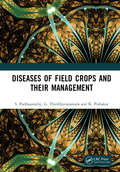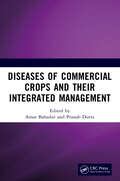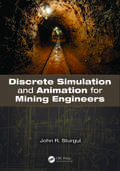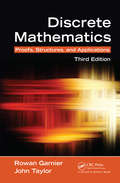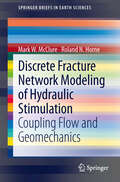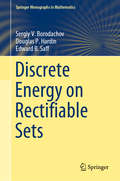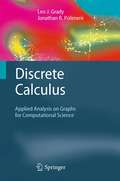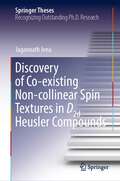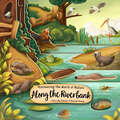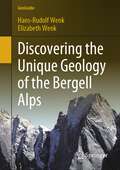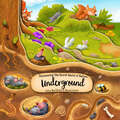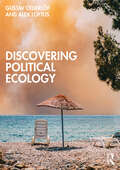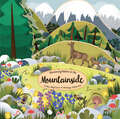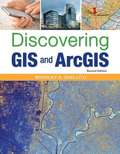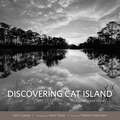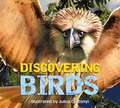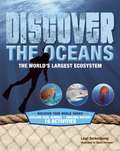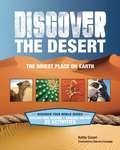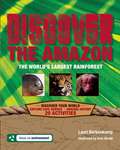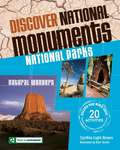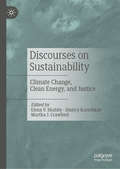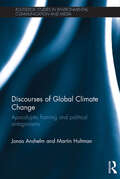- Table View
- List View
Diseases of Field Crops and their Management
by S. Parthasarathy G. Thiribhuvanamala K. PrabakarThe book entitled Diseases of Field Crops and their Management provides most recent information about major diseases of cultivation field crops, their symptoms, pathogen characters, epidemiology, and management. In order to make the book all in one, the importance of major diseases has also been dealt with in brief. Note: T&F does not sell or distribute the Hardback in India, Pakistan, Nepal, Bhutan, Bangladesh and Sri Lanka.
Diseases of Commercial Crops and Their Integrated Management
by Amar Bahadur Pranab DuttaThis volume compiles information on different aspects of diseases of commercial crops and their management. It contains 17 chapters based on different crops contributed by various authors. The book will be helpful for the students pursuing their degree in Agricultural Sciences, growers, teachers, extension personnel, and fellow researchers in their respective fields.
Discrete Systems And Integrability
by J. Hietarinta N. Joshi F. W. NijhoffThis first introductory text to discrete integrable systems introduces key notions of integrability from the vantage point of discrete systems, also making connections with the continuous theory where relevant. While treating the material at an elementary level, the book also highlights many recent developments. Topics include: Darboux and Bäcklund transformations; difference equations and special functions; multidimensional consistency of integrable lattice equations; associated linear problems (Lax pairs); connections with Padé approximants and convergence algorithms; singularities and geometry; Hirota's bilinear formalism for lattices; intriguing properties of discrete Painlevé equations; and the novel theory of Lagrangian multiforms. The book builds the material in an organic way, emphasizing interconnections between the various approaches, while the exposition is mostly done through explicit computations on key examples. Written by respected experts in the field, the numerous exercises and the thorough list of references will benefit upper-level undergraduate, and beginning graduate students as well as researchers from other disciplines.
Discrete Simulation and Animation for Mining Engineers
by John SturgulGeneral Purpose Simulation System (GPSS) is a special computer programming language primarily used to simulate what can be classified as discrete systems. A discrete system is one where, at any given instant in time, a countable number of things can take place. The basic operation of a mine itself can be considered such a system. Discrete Simulatio
Discrete Mathematics: Proofs, Structures and Applications, Third Edition
by John Taylor Rowan GarnierTaking an approach to the subject that is suitable for a broad readership, Discrete Mathematics: Proofs, Structures, and Applications, Third Edition provides a rigorous yet accessible exposition of discrete mathematics, including the core mathematical foundation of computer science. The approach is comprehensive yet maintains an easy-to-follow prog
Discrete Fracture Network Modeling of Hydraulic Stimulation
by Roland N. Horne Mark W. McclureDiscrete Fracture Network Modeling of Hydraulic Stimulation describes the development and testing of a model that couples fluid-flow, deformation, friction weakening, and permeability evolution in large, complex two-dimensional discrete fracture networks. The model can be used to explore the behavior of hydraulic stimulation in settings where matrix permeability is low and preexisting fractures play an important role, such as Enhanced Geothermal Systems and gas shale. Used also to describe pure shear stimulation, mixed-mechanism stimulation, or pure opening-mode stimulation. A variety of novel techniques to ensure efficiency and realistic model behavior are implemented, and tested. The simulation methodology can also be used as an efficient method for directly solving quasistatic fracture contact problems. Results show how stresses induced by fracture deformation during stimulation directly impact the mechanism of propagation and the resulting fracture network.
Discrete Energy on Rectifiable Sets (Springer Monographs in Mathematics)
by Edward B. Saff Sergiy V. Borodachov Douglas P. HardinThis book aims to provide an introduction to the broad and dynamic subject of discrete energy problems and point configurations. Written by leading authorities on the topic, this treatise is designed with the graduate student and further explorers in mind. The presentation includes a chapter of preliminaries and an extensive Appendix that augments a course in Real Analysis and makes the text self-contained. Along with numerous attractive full-color images, the exposition conveys the beauty of the subject and its connection to several branches of mathematics, computational methods, and physical/biological applications. This work is destined to be a valuable research resource for such topics as packing and covering problems, generalizations of the famous Thomson Problem, and classical potential theory in Rd. It features three chapters dealing with point distributions on the sphere, including an extensive treatment of Delsarte–Yudin–Levenshtein linear programming methods for lower bounding energy, a thorough treatment of Cohn–Kumar universality, and a comparison of 'popular methods' for uniformly distributing points on the two-dimensional sphere. Some unique features of the work are its treatment of Gauss-type kernels for periodic energy problems, its asymptotic analysis of minimizing point configurations for non-integrable Riesz potentials (the so-called Poppy-seed bagel theorems), its applications to the generation of non-structured grids of prescribed densities, and its closing chapter on optimal discrete measures for Chebyshev (polarization) problems.
Discrete Element Method for Multiphase Flows with Biogenic Particles: Agriculture Applications
by Ling Zhou Ramesh K. Agarwal Weidong Shi Mahmoud A. ElemamThis book presents the advanced theory and application of the combined Computational Fluid Dynamics – Discrete Element Method (CFD-DEM) to multiphase flow simulations of the gas and bio-particulate matter of non-uniformly shaped biomass. It explores how DEM can simulate the complex behaviour of biomass particles, such as their packing in the multiphase flows that occurs in the agricultural product processing industries. It offers an overview of aerodynamic systems, such as cyclone separators, used in the agricultural processing industry. A detailed description of DEM modeling, including the particle-particle, particle-boundary, and particle-fluid interactions in the context of biomass particles of varying sizes and shapes, is provided. Coverage includes the critical application of CFD-DEM simulation technology in designing and optimizing grain handling and processing equipment and the application of extended DEM to other granular flows of complex particles like sand, powders, and dust from mines where clumping and agglomeration occur. The application of DEM in modeling and simulation of complex multiphase systems can help improve productivity, reduce costs, and increase efficiency in the agricultural industry.
Discrete Calculus
by Leo J. Grady Jonathan R. PolimeniThe field of discrete calculus, also known as "discrete exterior calculus", focuses on finding a proper set of definitions and differential operators that make it possible to operate the machinery of multivariate calculus on a finite, discrete space. In contrast to traditional goals of finding an accurate discretization of conventional multivariate calculus, discrete calculus establishes a separate, equivalent calculus that operates purely in the discrete space without any reference to an underlying continuous process. This unique text brings together into a single framework current research in the three areas of discrete calculus, complex networks, and algorithmic content extraction. Although there have been a few intersections in the literature between these disciplines, they have developed largely independently of one another, yet researchers working in any one of these three areas can strongly benefit from the tools and techniques being used in the others. Many example applications from several fields of computational science are provided to demonstrate the usefulness of this framework to a broad range of problems. Readers are assumed to be familiar with the basics of vector calculus, graph theory, and linear algebra. Topics and features: presents a thorough review of discrete calculus, with a focus on key concepts required for successful application; unifies many standard image processing algorithms into a common framework for viewing a wide variety of standard algorithms in filtering, clustering, and manifold learning that may be applied to processing data associated with a graph or network; explains how discrete calculus provides a natural definition of "low-frequency" on a graph, which then yields filtering and denoising algorithms; discusses how filtering algorithms can give rise to clustering algorithms, which can be used to develop manifold learning and data discovery methods; examines ranking algorithms, as well as algorithms for analyzing the structure of a network. Graduate students and researchers interested in discrete calculus, complex networks, image processing and computer graphics will find this text/reference a clear introduction to the foundations of discrete calculus as well as a useful guide to have readily available for their work. Dr. Leo J. Grady is a Senior Research Scientist with Siemens Corporate Research in Princeton, New Jersey, USA. Dr. Jonathan R. Polimeni is a Research Fellow at the Massachusetts General Hospital in Boston, Massachusetts, USA, and Instructor in Radiology at Harvard Medical School, Boston, Massachusetts, USA.
Discovery of Co-existing Non-collinear Spin Textures in D2d Heusler Compounds (Springer Theses)
by Jagannath JenaNon-collinear spin textures have attracted significant attention due to their topological nature, emergent electromagnetic properties, and potential spintronic and magnonic device applications. This book explores the physical properties of distinct spin textures in D2d compounds. The main goals of the work are (a) discovering new spin textures in D2d Heusler compounds and studying their detailed properties to enrich the field of non-collinear magnetism (b) optimizing the nano-track geometry and generating isolated and single chains of nano-objects that will establish new hallmarks for technological applications (c) studying the stability of spin textures with magnetic fields and temperatures and finding a way to observe the striking behavior of spin textures near the specimen edges. The first few chapters provide a brief overview of spin textures such as Bloch and Néel skyrmions. In the experimental methods section, the author shows how to identify the single-crystalline grains of a polycrystalline sample, how to make single-crystalline thin specimens and nano-tracks, and then provides explicit descriptions of different imaging techniques performed on a transmission electron microscope. This part will be valuable for beginners wishing to conduct research in experimental nano-magnetism and transmission electron microscope imaging. The core results of the book are presented in four chapters, describing the discovery of several new and unanticipated spin textures, namely square-shaped antiskyrmions, elliptical Bloch skyrmions, fractional antiskyrmions, fractional Bloch skyrmions and elongated (anti)skyrmions in a single D2d Heusler compound. It is shown that these textures can be understood by a combination of dipole-dipole interactions and a chiral vector exchange that makes it possible to stabilize various spin textures even in the same compound. The D2d compounds are the first non-centrosymmetric systems shown to host several co-existing non-collinear spin textures.
Discovering the World of Nature Along the Riverbank
by Petra Bartíková Marcel KrálikWith delightful illustrations and fascinating facts aimed at young readers, this children&’s book explores the natural world of riverbanks. Have you ever wondered how and why beavers build their dams, how otters live, or how frogs come to be? Now you can find out! This charming picture book teaches young children what it&’s like to be an animal living on and in the water. With each turn of the page, this volume reveals dozens of adorable illustrations, educational captions, and vocabulary words. From beavers and otters to snakes, frogs, newts, and more, children will love learning all about these busy aquatic animals and the amazing lives they live! This is a fixed-format ebook, which preserves the design and layout of the original print book
Discovering the Unique Geology of the Bergell Alps (GeoGuide)
by Hans-Rudolf Wenk Elizabeth WenkThis book aims to introduce scientists and educated laymen to the fascinating geology of the Bergell Alps, first with some background information on geology, tectonics, minerals and rocks and then to lead readers on excursions to observe geological features in the field. We believe the best way to make readers familiar with local geology is to lead them to intriguing outcrops. Such books are common in North America, but missing in Europe, particularly for the Alps. With this work, we use hands-on experience at a series of sites to educate readers how individual outcrops, moraines, landslides or other features contribute to our broader understanding of the region’s unique geology.
Discovering the Secret World of Nature Underground
by Petra Bartíková Marcel KrálikYoung readers discover the fascinating world of animals and insects that live underground in this beautifully illustrated children&’s book. Have you ever wondered what it would be like to be an animal that lives underground? Now you can find out! With each turn of the page, this engaging picture book reveals dozens of adorable illustrations, educational captions, vocabulary words, and more—all exploring the underground habitat of several kinds of animals. From rabbits and mice to badgers, ants, and other insects, children will love learning all about these busy animals that burrow below! This is a fixed-format ebook, which preserves the design and layout of the original print book
Discovering the Deep
by Michael R. Perfit Jeffrey A. Karson Deborah S. Kelley Daniel J. Fornari Michael R. Perfit Timothy M. Shank Jeffrey A. Karson Deborah S. Kelley Daniel J. FornariThe deep oceans and global seafloor are truly Earth's last frontier. They remain largely unexplored, yet are critical to our survival on this planet. This magnificent, full-color volume transports you to bizarre landscapes hosting exotic life forms that rival the most imaginative science fiction. Starting with a historical summary of seafloor exploration and the developing technologies used to study this extreme environment, it then describes the distinctive geologic components of the Earth's ocean floor and the unusual biological communities found along the mid-ocean ridges. This is an indispensable reference for researchers, teachers, and students of marine science, and a visually stunning resource that will enlighten and intrigue oceanographers and enthusiasts alike. A suite of online resources, including photographs and video clips, combine with the book to provide fascinating insights into the hidden world of seafloor geology and biology using the latest deep-sea imaging and geological concepts.
Discovering Political Ecology
by Alex Loftus Gustav CederlöfPolitical ecology is one of the most vibrant fields of environmental research. This book introduces political ecology to a new generation of students in a daring new way: as an interdisciplinary approach to environmental research but also as a series of lived realities and a praxis for change. The origins of political ecology are often traced through an Anglo-American canon. In Discovering Political Ecology, Gustav Cederlöf and Alex Loftus instead take up the challenge of presenting the key conversations and the diverse traditions that have shaped this field with attention to its extensive international roots. Inspired by voices and research in Asia, Africa, Europe and the Americas, the authors address the concerns of those who from different social backgrounds have grown up in a world shaped by climate change and increasing environmental inequalities.Engaging and accessible in style, Discovering Political Ecology introduces a set of key concepts around which conversations in political ecology coalesce. It also shows how these concepts allow you to make sense of some of the most pressing issues of our time—issues around water, energy, agriculture, forestry, climate change and environmental justice. Each chapter includes learning outcomes and suggested further readings, extensive bibliographies and seminar activities to be used by students and educators. At the cutting edge of the field, the book will be of interest to those in all disciplines brought together in political ecology, including but not limited to anthropology, development studies, ecology, geography, history and political science.
Discovering Nature on the Mountainside
by Lenka Chytilová Hedviga GutierrezThis beautifully illustrated and educational children&’s book explores mountain wildlife and how different animals live through the seasons. Strap on your boots and set out to explore a gorgeous mountainside! Discover all the amazing animals that call the mountains home. See how they live throughout the seasons—from bears and bats to eagles, mountain goats, marmots, and so much more. From which animals turn white when it snows to which are the best ice and rock climbers, young readers will learn all kinds of fun facts in this delightful picture book. This is a fixed-format ebook, which preserves the design and layout of the original print book
Discovering GIS and ArcGIS
by Bradley A. ShellitoEach chapter focuses on using a variety of ArcGIS tools in a real-world context. At the start of each chapter, a scenario puts the student in a particular role with a number of tasks to accomplish. These scenarios include the role of a park ranger trying to find the best overland route to rescue a group of stranded hikers (Chapter 19), a delivery person finding the shortest driving route between a set of libraries (Chapter 11), and an urban planner trying to determine the minimum height necessary for constructing an observation platform (Chapter 15). Because the early chapters teach basic GIS and ArcGIS skills using data that can be easily replicated for a local area, the scenarios used are simple. The scenarios used in later chapters become more specific (as the book assumes that students have mastered the basic skills and can work with more difficult or involved tasks). In addition, each chapter describes professions and applications in the real world that make use of the chapter's theory and skills.
Discovering Cat Island: Photographs and History
by John CuevasCat Island, just off the Mississippi Gulf Coast shoreline, has been home to some of the most dramatic events and remarkable stories in the nation's history. While some of these stories are fact, others are colorful fables passed down through the ages with such conviction they have become true in the hearts and minds of many. Between fact and fiction is the undeniable reality: Cat Island is one of the most historically significant landmarks on the Mississippi Gulf Coast.Featuring over 160 black-and-white photographs by Jason Taylor and a foreword by Mississippi's Secretary of State Delbert Hosemann, John Cuevas's Discovering Cat Island guides readers through Cat Island with stories and histories of twenty-nine sites--both real and imagined--of the legendary barrier island. Originally owned by the Cuevas family as part of a Spanish land grant to Juan de Cuevas in 1781, Cat Island boasts a colorful history that includes events related to the notorious pirate Jean Lafitte and the outlaw James Copeland, both of whom were thought to have buried their stolen treasure somewhere on the island; the Battle of New Orleans; and the War of 1812. The island served as one of the staging areas for the Seminole forced to abandon their homes and take part in the Trail of Tears. In the twentieth century, the island was a convenient transfer point for gangsters and local bootleggers shipping booze during Prohibition before becoming a US military training camp site during World War II. In 1988, Cat Island became the location of the first oil drilling ever in the Mississippi Sound and in 2010 was one of the islands devastated by the BP Deepwater Horizon oil spill.
Discovering Birds: The Ultimate Handbook to the Birds of the World
by Roger LedererTake a journey through the fascinating world of birds with this tactile book jam-packed with scientific facts and incredible full-color illustrations.From soaring eagles to colorful parrots, this book explores the diverse array of birds that inhabit our world. Learn about each species' life cycle, nesting habits, migration patterns, behaviors, physical characteristics, and distinct songs.Inside you'll find:Profiles of 100+ amazing birds across a range of habitatsFun facts highlighting the fascinating features of each speciesIncredible full-page illustrationsDesigned to inspire curiosity and a love of nature, Discovering Birds promises to encourage a lifelong appreciation of learning and the great outdoors.
Discover the Oceans
by Lauri Berkenkamp Chuck ForsmanFrom both a historical and scientific point of view, above and below the surface, this engaging guide brings the world's oceans to life through fun facts, illustrations, and in-depth information. Interactive activities appear throughout, ranging from making solar stills and simple fishing spears to experimenting with a homemade diving bell and figuring out how much water it really takes to survive. With the oceans being the least explored environment on Earth, this reference illuminates some of the most incredible and surprising plants and animals as well as how to survive and navigate these vast expanses.
Discover the Desert
by Sam Carbaugh Kathryn CeceriDelving into a seemingly dry and barren ecosystem, this fun-filled activity book closely examines the desert landscape and shows how many exciting discoveries it holds. Exploring native plants and animals and depicting the extreme temperatures, rough terrain, and vast distances in detail, this lively reference describes lost civilizations as well as today's desert-dwelling cultures. "Try This" science and history activities are also included-from creating mirages and fashioning an Anasazi clay bowl to growing salt crystals and even assembling a cactus dish terrarium. Demonstrating why adventurers have always been drawn to the world's deserts, this entertaining overview also provides education on the environment, examining how the health of the planet depends on the careful treatment of the desert's many resources.
Discover the Amazon
by Blair Shedd Lauri BerkenkampFrom avoiding predators to navigating through the jungle without a compass, this innovative guide provides kids with the vital tools one would need if lost in the Amazon. Offering practical survival techniques based on real stories, children will learn lessons that can be adapted to almost any outdoor situation, such as making fire, deciphering animal tracks, and using the natural world for all to create necessary supplies. Opening with an informative section on the region and its people, this essential resource combines history and science in a fun and engaging way. Facts and sidebars on the local creatures and plants are interspersed along with 15 activities for the home or classroom-from making a fishing spear to determining how much water is needed to stay healthy.
Discover National Monuments
by Cynthia Light Brown Blair SheddFascinating facts about America's most popular natural landmarks provide the backbone for this fun-filled collection of activities that replicate the organic processes that formed them. Interspersed with history, factoids, and sidebars, this engaging reference explores scientific concepts, such as the formation of coral reefs and the cause of volcanic eruptions. Each monument-from the Lava Beds to the Petrified Forest-is showcased in a graphic multipage spread and is followed by hands-on experiments, allowing children to make their own stalactites and discover how a river can erode rock into a canyon. Expressing true appreciation for the United States' natural wonders, this comprehensive guide clearly illustrates their formation, from glittering caves to giant trees.
Discourses on Sustainability: Climate Change, Clean Energy, and Justice
by Martha J. Crawford Elena V. Shabliy Dmitry KurochkinThis volume presents an in-depth analysis of climate change problems and discusses the proliferation of renewable energy worldwide—in conjunction with such important questions as social justice and economic growth, providing an interdisciplinary approach to sustainable development. Exploring various responses to human-induced climate change, the book offers a critical reflection on climate change and clean energy and highlights the fundamental problems of international energy justice and human rights. Examining these and other climate-related issues from legal, business, political, and scientific perspectives, the volume also analyzes the impact of economic factors and policies on climate change mitigation and adaptation.
Discourses of Global Climate Change: Apocalyptic framing and political antagonisms (Routledge Studies in Environmental Communication and Media)
by Martin Hultman Jonas AnshelmThis book examines the arguments made by political actors in the creation of antagonistic discourses on climate change. Using in-depth empirical research from Sweden, a country considered by the international political community to be a frontrunner in tackling climate change, it draws out lessons that contribute to the worldwide environmental debate. The book identifies and analyses four globally circulated discourses that call for very different action to be taken to achieve sustainability: Industrial fatalism, Green Keynesianism, Eco-socialism and Climate scepticism. Drawing on risk society and post-political theory, it elaborates concepts such as industrial modern masculinity and ecomodern utopia, exploring how it is possible to reconcile apocalyptic framing to the dominant discourse of political conservatism. This highly original and detailed study focuses on opinion leaders and the way discourses are framed in the climate change debate, making it valuable reading for students and scholars of environmental communication and media, global environmental policy, energy research and sustainability.
